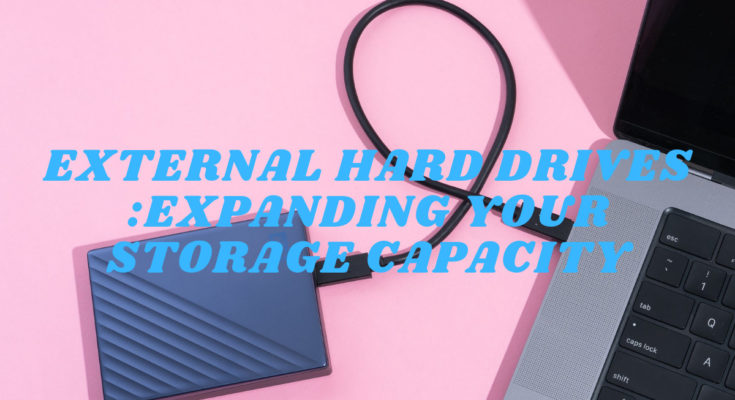EXTERNAL HARD DRIVES:-
An external hard drive is a type of storage device that is used to store data outside of a computer or other electronic device. It connects to a computer via a USB or other interface and can be used to backup important files, store large media files like videos and photos, and expand the storage capacity of a computer.
External hard drives are available in various sizes, ranging from a few gigabytes to several terabytes. They can be portable or desktop-sized, with portable hard drives being small enough to fit in a pocket and desktop-sized hard drives being larger and meant to be stationary.
There are different types of external hard drives available on the market, including traditional hard disk drives (HDD) and solid-state drives (SSD). HDDs have spinning disks that store data, while SSDs use flash memory. SSDs are generally faster and more durable than HDDs, but they can be more expensive.
When choosing an external hard drive, it’s important to consider factors such as capacity, speed, reliability, and price. It’s also a good idea to choose a reputable brand and read reviews before making a purchase.
EXTERNAL HARD DRIVES: EXPANDING YOUR STORAGE CAPACITY
External hard drives are an excellent way to expand your storage capacity. They offer a convenient and cost-effective solution for storing large amounts of data, including documents, photos, music, videos, and other files.
To use an external hard drive, you need to connect it to your computer via a USB cable or other interface. Once connected, you can transfer files between your computer and the external hard drive just like you would with an internal hard drive. You can also use external hard drives to create backups of your important data, which can help protect against data loss due to hardware failure, viruses, or other issues.
When selecting an external hard drive, consider the storage capacity you need, as well as the speed and connectivity options. If you plan to use the external hard drive for large media files or video editing, a high-capacity and fast drive is recommended. On the other hand, if you just need additional storage for documents or other small files, a lower-capacity and slower drive may suffice.
Overall, external hard drives are a convenient and practical solution for expanding your storage capacity, and they can be a great investment for anyone who needs to store large amounts of data.
TYPES :-
There are several types of external hard drives available on the market, including:
1. Traditional Hard Disk Drives (HDDs): These are the most common type of external hard drives. They consist of spinning disks that store data and a read/write head that reads and writes data to the disks. HDDs are available in different sizes and capacities, and they are generally less expensive than other types of external hard drives.
2. Solid State Drives (SSDs): SSDs use flash memory instead of spinning disks to store data. They are faster, more durable, and more energy-efficient than HDDs, but they are also more expensive. SSDs are ideal for users who need fast access to data or who want a drive that is less prone to mechanical failure.
3. Network-Attached Storage (NAS) Drives: These drives are designed to be connected to a network rather than a single computer. They are ideal for users who need to share data across multiple devices or who want to create a centralized storage system for their home or office.
4. RAID Drives: RAID (Redundant Array of Independent Disks) drives are designed to store data redundantly across multiple hard drives. This provides added protection against data loss due to hardware failure. RAID drives are available in different configurations, including RAID 0, RAID 1, RAID 5, and RAID 10.
5. Wireless Drives: Wireless external hard drives allow you to store and access data without the need for cables or a physical connection to your computer. They use Wi-Fi or Bluetooth to connect to your devices and are ideal for users who need to access data on the go or who want a more flexible storage solution.
When choosing an external hard drive, consider your needs in terms of storage capacity, speed, connectivity, and budget, and choose the type of drive that best meets your requirements.



